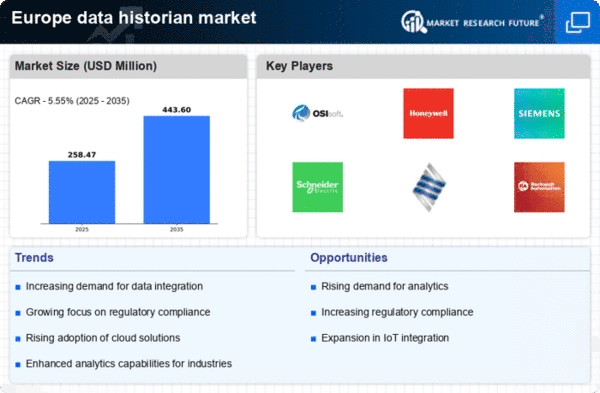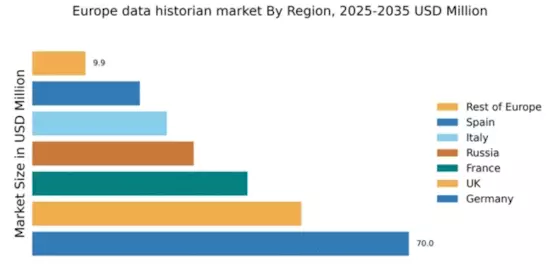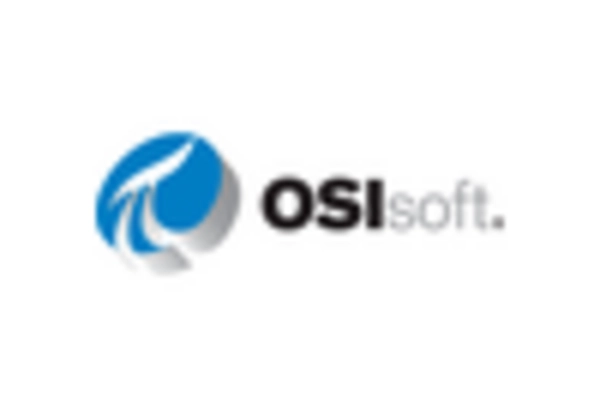Advancements in Data Storage Technologies
Advancements in data storage technologies are significantly influencing the data historian market. The emergence of high-capacity storage solutions, such as cloud storage and distributed databases, allows organizations to manage vast amounts of historical data efficiently. In Europe, the data storage market is anticipated to reach €50 billion by 2026, with a substantial portion attributed to data historian applications. These advancements enable businesses to store, retrieve, and analyze historical data more effectively, which is essential for industries that rely on long-term data trends for decision-making. Consequently, the integration of innovative storage technologies is likely to enhance the capabilities of data historian solutions, driving market growth.
Increased Focus on Operational Efficiency
The heightened focus on operational efficiency is a significant driver in the data historian market. Organizations across various sectors are increasingly seeking ways to streamline their operations and reduce costs. Data historians play a crucial role in this endeavor by providing insights into historical performance data, enabling companies to identify inefficiencies and optimize processes. In Europe, the push for operational excellence is reflected in the growing investment in data analytics solutions, which is expected to reach €30 billion by 2027. This trend suggests that as businesses strive for greater efficiency, the demand for data historian solutions that facilitate data-driven decision-making will continue to rise.
Regulatory Compliance and Data Governance
Regulatory compliance and data governance are becoming increasingly crucial in the data historian market. European regulations, such as the General Data Protection Regulation (GDPR), impose strict guidelines on data management and storage. Companies are compelled to adopt data historian solutions that ensure compliance with these regulations, which can be complex and multifaceted. The market is witnessing a shift towards solutions that not only store data but also provide robust governance frameworks. This trend is expected to drive growth, as organizations invest in technologies that facilitate compliance, thereby enhancing their operational integrity and reducing the risk of penalties associated with non-compliance.
Rising Demand for Real-Time Data Analysis
The increasing need for real-time data analysis is a pivotal driver in the data historian market. Industries such as manufacturing and energy are increasingly reliant on immediate insights to enhance operational efficiency. In Europe, the market for real-time data analytics is projected to grow at a CAGR of approximately 15% from 2025 to 2030. This growth is largely attributed to the need for timely decision-making and predictive maintenance, which are critical in sectors where downtime can lead to substantial financial losses. As organizations strive to optimize their processes, the demand for data historian solutions that can provide real-time data access and analysis is likely to surge, thereby propelling the market forward.
Growing Adoption of Predictive Maintenance Strategies
The growing adoption of predictive maintenance strategies is emerging as a key driver in the data historian market. Industries such as manufacturing, transportation, and utilities are increasingly implementing predictive maintenance to minimize equipment failures and reduce downtime. By leveraging historical data, organizations can forecast potential issues and schedule maintenance proactively. In Europe, the predictive maintenance market is projected to grow at a CAGR of 20% from 2025 to 2030, indicating a robust demand for data historian solutions that support these strategies. This trend underscores the importance of historical data in enhancing operational reliability and efficiency, thereby propelling the data historian market forward.

















